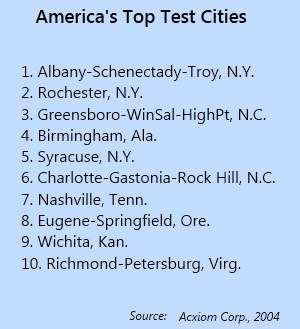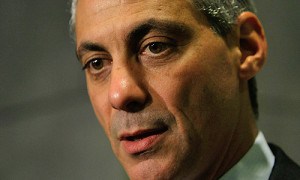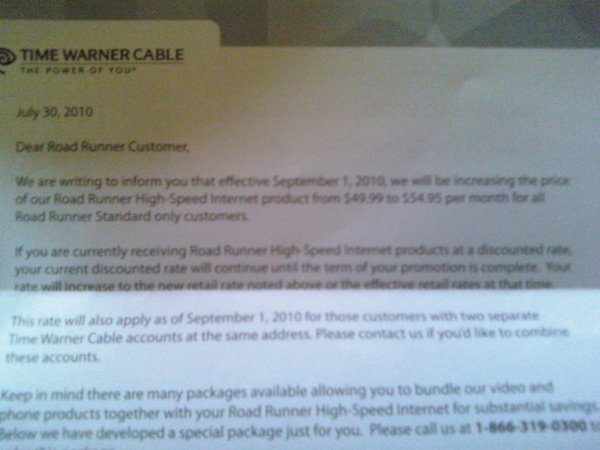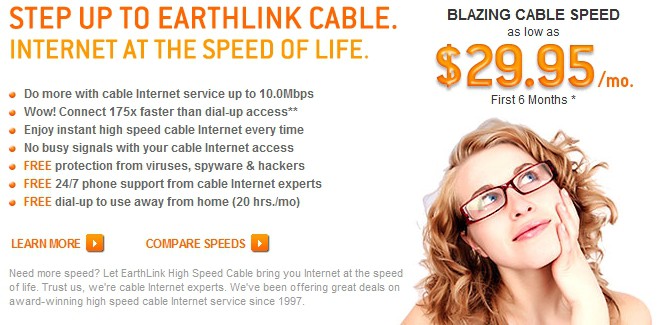 Time Warner Cable is probably changing your channel lineup, or already has — removing several analog channels you used to receive as part of your Standard Service subscription and moving them to digital.
Time Warner Cable is probably changing your channel lineup, or already has — removing several analog channels you used to receive as part of your Standard Service subscription and moving them to digital.
For customers with digital set top boxes, the change happens without most noticing the difference. The formerly analog signal still shows up in the same place, only the transmission format has changed.
But customers without set top boxes will notice as channels disappear forever from their lineups, replaced with… nothing. But their cable bills will remain exactly the same, despite the loss of channels.
For Stop the Cap! readers like Bev, today spelled the end of Animal Planet and The Travel Channel, among others. For those in Rochester, N.Y., last night was the last chance to watch C-SPAN 2, The Travel Channel, TruTV, Discovery Health, and Shop NBC in analog. In Buffalo, it was bye-bye to The Travel Channel, C-SPAN 2, TV Guide Channel, and CMT.
It some states, particularly Texas, Time Warner Cable is sticking it to Public Access, Educational, and Government channels, moving them all to digital. In some cases, cable companies and AT&T U-verse have managed to forever bury these PEG channels in Digital Channel Siberia with channel numbers in the high hundreds or even thousands. For many subscribers, a search and rescue team couldn’t find their new channel positions.
It’s all a part of a larger plan to slowly erode away analog channels in favor of digital service, which takes up far less bandwidth on Time Warner Cable systems.
As cable systems are nearing capacity and do not wish to spend millions to commit to further upgrades, switching out analog service in favor of digital can provide enormous new capacity to accommodate HD channels and forthcoming DOCSIS 3 cable modem service upgrades.
Unfortunately, these channel changes will irritate subscribers who do not want to pay for set top boxes and do not want them on their televisions. If you are among this group of box-haters, Time Warner Cable will continue to slowly drop more and more of the channels you used to watch without bothering to reduce your bill for the channels you no longer get. Eventually, virtually all analog channels will probably disappear, replaced by digital versions you will need a set top box to view.
In many areas of upstate New York, Time Warner is trying to placate angry subscribers by offering one set top box at no charge for one year. But here comes the tricks and traps — Stop the Cap! confirmed with Time Warner Cable this evening that only those customers without any set top boxes in their home can take advantage of this free offer. If you already have a box, you’ll continue to pay for it even though your neighbor is getting one free for a year. After the year is up, pony up — each box costs $7.80 a month ($7.50 for the box, $0.30 for the remote).
At least Texans are getting a better deal from Time Warner Cable — Broadcast Basic subscribers will get their boxes free for five years, Standard Service customers will get them for one year. But beware — if Time Warner needs to roll a truck to install your box in the San Antonio area, be prepared to cough up $39 for the service call.
For broadband customers, there is some good news. Virtually all major Time Warner Cable service areas facing channel changes like this will receive DOCSIS 3 upgrades and the chance to obtain faster Internet service by the end of 2010, even those communities bypassed for earlier upgrades. You will also get additional HD channels. In western New York, for example, Time Warner Cable plans to add a large number of HD cable channels by mid-fall:
On or About September 2, 2010:
Style HD
BBC America HD
On or About September 9, 2010:
National Geographic Wild HD
MTV HD
Comedy Central HD
Nickelodeon HD
Spike HD
On or About September 16, 2010:
History Channel International HD
CMT HD
Hallmark HD
VH-1 HD
Cooking Channel HD
DIY HD
TWCSN HD
YNN HD
On or About October 1, 2010:
Womans Max HD
HBO Latino HD


 Subscribe
Subscribe





